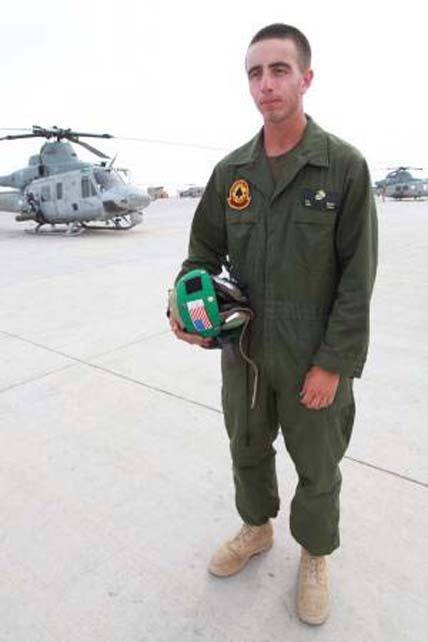Situated in a remote desert area, far from population centers, the base runs four miles long by two miles wide.
It includes an airstrip, a field hospital and full accommodation for the 2,000 military men and women stationed there.
Camp Bastion is the main British military base in Afghanistan, with plenty of U.S. personnel to go around, fulfilling their duty, however long and hard.
For instance, the airfield handles some 600 fixed-wing and rotary-wing aircraft movements every day, operating combat, medical and logistics flights.
Lance Cpl. Devon L. Beers makes sure such sophisticated aircraft take wing each day. It is his job, and one that is challenging and, at times, difficult.
Such is his duty.
“Why the Marines?” he was asked of his decision to join the Corps. “They are the best, sir.”
The 21-year-old Auburn native is an avionics technician with the Marine Light Attack Helicopter Squadron 267, deployed in the heart of a hot, arid and war-plagued country. Beers – who is three months into a seven-month tour, his first as a young Marine – works on AH-1W Cobra, a two-bladed, single-engine attack chopper, and the UH-1Y Huey, a twin-engine, medium-size utility helicopter. He works specifically on avionics, overlooking and maintaining the attack helicopters’ electronic components and systems.
Plenty can go wrong, but Beers keeps the blades spinning when ground forces need air support at a moment’s notice.
“Some of the equipment is old,” he admitted, “but a lot of it is new and sophisticated.”
And vital to combat operations as the U.S. continues to maintain a strong presence in the war on terror. Camp Bastion remains a logistics hub for operations in the Helmand Province.
The main military effort in Afghanistan is expected to shift next year from Helmand and the other southern province of Kandahar, where U.S. and Afghan forces have acquired some measure of fragile security gains over the last year, to the east, where the Taliban insurgency remains strong.
President Obama plans to announce a troop reduction in Afghanistan that Pentagon and other administration officials say should bring home about 10,000 personnel by the end of the year. Obama is planning to give leeway to military commanders about the pacing of a planned withdrawals and the types of forces to be pulled out, officials said.
All of which means little to Beers, who carefully goes about his business without complaint. His responsibility comes with the discomfort of applying his craft in the searing heat of the day.
It is by no means a picnic.
“It can be 120-130 degrees,” he said. “It’s pretty hot, but I make sure I stay busy and drink plenty of water all day.”
Staying busy has been the key. The experience at a military camp in the middle of nowhere is all about staying busy.
“It’s pretty much what I expected,” said Beers, who likes to play guitar or work out at the gym in his spare time. “Time has really gone fast by staying busy. And we don’t see too much of the country or the people because of where we are located.”
Born and raised in Auburn, Beers decided the Marine Corps was the place for him after graduating from Auburn Mountainveiw High School in 2008. He did his basic training at Camp Pendleton before he got his orders to go overseas.
Just where he will go next is uncertain, but he stands to honor his four-year commitment.
Beers, son of Dondi and Wendy Beers, hopes to one day get married, raise a family and parlay his military training into a civilian career in avionics, perhaps with a helicopter company.
He misses home, his family and the opportunity to hike and camp in the great Northwest. But, for now, he is all about doing time and sacrifice for his country.
“Things are going well,” he said. “This is something I wanted to do entirely on my own.
“It was pretty hard, but you just do what you are told and get through it. … You just do your hardest.”
Spoken like a true Marine, doing a tough job half a world away.


